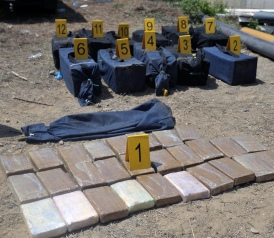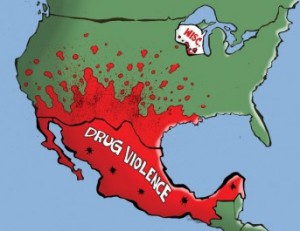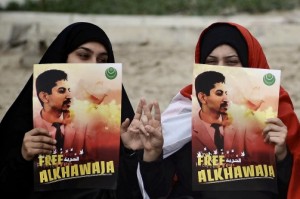Read this post in English
Las noticias más recientes describen la relación entre Los Estados Unidos y América Latina como una centralizada alrededor de La Guerra Contra El Narcotráfico. En un blog anterior que escribí, describí los cárteles en México que se han convertido en una de las peores fuentes de violencia en América Latina. También señale el impacto global de ellos, que se atribuye principalmente a la demanda de drogas de los EE.UU. Esta creciente epidemia también ha creado una llamada de acción para que los países se unan y encuentren una solución.  Pero, por supuesto, esto es más fácil dicho que hecho. El diálogo más reciente que el presidente Obama tuvo con los líderes de países latinoamericanos demuestra que aun hay un desacuerdo sobre el camino apropiado. La semana pasada mencioné otra disputa que el Presidente Obama tuvo con América Latina, durante la VI Cumbre de las Américas, con respecto a la participación de Cuba en la Cumbre de 2015. Además de las obvias diferencias de opinión que el presidente Obama tiene con otros líderes referente a este tema, quiero señalar que esta es una decisión de política exterior que afectará directamente a todo los ciudadanos del hemisferio occidental. Creo que parte de la frustración de todos estos líderes tiene que ver con el hecho de que este es un problema mundial que no respeta fronteras y que continúa extendiéndose a varios países.
Pero, por supuesto, esto es más fácil dicho que hecho. El diálogo más reciente que el presidente Obama tuvo con los líderes de países latinoamericanos demuestra que aun hay un desacuerdo sobre el camino apropiado. La semana pasada mencioné otra disputa que el Presidente Obama tuvo con América Latina, durante la VI Cumbre de las Américas, con respecto a la participación de Cuba en la Cumbre de 2015. Además de las obvias diferencias de opinión que el presidente Obama tiene con otros líderes referente a este tema, quiero señalar que esta es una decisión de política exterior que afectará directamente a todo los ciudadanos del hemisferio occidental. Creo que parte de la frustración de todos estos líderes tiene que ver con el hecho de que este es un problema mundial que no respeta fronteras y que continúa extendiéndose a varios países.
Entonces, ¿qué piensa de América Latina? Durante la Cumbre, los líderes latinoamericanos persuadieron al presidente Obama que pensara en alternativas a la guerra fracasada. Estas alternativas incluyen la legalización y despenalización de las drogas. Estas alternativas han surgido debido a la creciente violencia vista en todos estos países. La mayor parte de la guerra de Washington contra el narcotráfico ha tenido lugar en América  Latina, dejando innumerables víctimas y familias muertas. Aunque los EE.UU. (especialmente, Hillary Clinton) ha estado presionando para continuar la guerra militarizada, se ha demostrado que esto no ha resuelto nada. Al contrario, parece como que esto se ha convertido en un juego para los cárteles. Los cárteles simplemente se mudan a un lugar o país diferente cada vez que ven una amenaza a su operación ilegal. Representante de EE.UU. Henry Cuéllar lo describe así “A medida que ponemos presión sobre México, ellos [los carteles] se están yendo a otros lugares con instituciones civiles frágiles”. Por ejemplo, los miembros del cártel de Sinaloa, que opera en la costa pacífica de México, fueron detenidos en la República Dominicana este mes. Estos patrones han empujado a los líderes a buscar una alternativa, donde los carteles se pueden erradicar y no simplemente desplazar.
Latina, dejando innumerables víctimas y familias muertas. Aunque los EE.UU. (especialmente, Hillary Clinton) ha estado presionando para continuar la guerra militarizada, se ha demostrado que esto no ha resuelto nada. Al contrario, parece como que esto se ha convertido en un juego para los cárteles. Los cárteles simplemente se mudan a un lugar o país diferente cada vez que ven una amenaza a su operación ilegal. Representante de EE.UU. Henry Cuéllar lo describe así “A medida que ponemos presión sobre México, ellos [los carteles] se están yendo a otros lugares con instituciones civiles frágiles”. Por ejemplo, los miembros del cártel de Sinaloa, que opera en la costa pacífica de México, fueron detenidos en la República Dominicana este mes. Estos patrones han empujado a los líderes a buscar una alternativa, donde los carteles se pueden erradicar y no simplemente desplazar.
Independientemente de si la legalización y la despenalización es el camino correcto, lo cierto es que la actual guerra contra el narcotráfico no es efectiva. También es evidente que los líderes de América Latina seguirán adelante con sus decisiones políticas, independientemente de la oposición que tiene los EE.UU. sobre la legalización de drogas. Muchos países están dirigiéndose hacia la legalización de las drogas, buscando desesperadamente una solución. Desafortunadamente, esto no tiene un resultado claro, sobre todo si hay políticas opuestas entre los EE.UU. y América Latina. Esto realmente puede ser desastroso. Debido a que esto se ha convertido en un problema global que incluye la pobre infraestructura gubernamental, la pobreza, el abuso de drogas, la violencia y mucho más, es necesario pensar profundamente sobre este tema. Tal vez más allá de eso, es necesario que se adapten medidas antes de que este problema se extienda aún más. Los gobiernos deben escuchar a sus ciudadanos, los cuales se verán directamente afectados por estas decisiones políticas. Tenemos que expresar nuestras preocupaciones y buscar el mejor camino dado todos estos obstáculos. ¿Qué creen ustedes que es el camino que debemos tomar?












